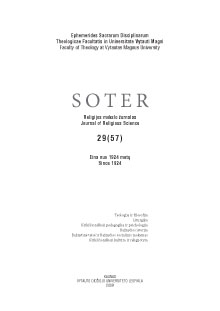Antanas Maceina: „Kuo jūs mane laikote?“ (Mt 16, 15)
ANTANAS MACEINA: “WHO DO YOU SAY THAT I AM?” (MT 16, 15)
Author(s): Marija OniščikSubject(s): Christian Theology and Religion
Published by: Vytauto Didžiojo Universitetas
Keywords: Lietuvos filosofja; neoscholastika; pasaulėžiūra; teologija; Lithuanian philosophy; Neo-Scholastics; Weltanschauung; theology
Summary/Abstract: The article aims at the historical investigation based on Antanas Maceina’s and his contemporaries’ memoirs, letters and various records about his life and work as a philosopher. In the title, the question of Maceina’s philosophical identity is raised. Who was Maceina in his own eyes, as well as in the eyes of his contemporaries and who is he today for the new generation of Lithuanian philosophers? In the beginning of the article, the theme of the “coming back”, suggested by Alvydas Šliogeris, is developed. The revival of the past turns to its loss, because “coming back” to the same world being the same is an impossible task. Today the new generation of Lithuanian philosophers does not know Maceina, at least they do not understand the problems of his philosophy adequately. In the contemporary world, Maceina’s philosophy is viewed as archaic and outdated probably because of the paradigm change which has occurred at the end of Modernity and has turned some fields of philosophy incommensurable. One of the fields changing is the greatconcern for one’s Weltanschauung consisted of certain positive unquestionable convictions. In Maceina’s case, being a Christian necessary entails having some convictions which can be hold “theological”. On the other hand, being a philosopher entails liberty of thought and interpretation. In this regard, “theological” sometimes means “forced” and “dogmatic”. In the article, Maceina’s attitude is compared to the Heidggerian one, exemplified by such prominent theologians as Jozeph Ratzinger and Karl Rahner. Maceina treats philosophy as being essentially a question and theology as an answer; it means their going contrariwise and inevitably getting into collusion. In the article, various historical and autobiographical sources are analyzed telling the story of Maceina’s philosophical education, his conflicts with Church authorities, his striving for admission into the field of theology, and the status of philosophy in his life. Whether Maceina was right holding himself a philosopher? Can we honestly believe him to be one? The proper historical investigation tells us that the ambivalent relationship between philosophy and theology in Maceina’s works was determined by Neo-Scholastic education of his youth. Later Maceina (either deliberately or not) has abandoned Scholastic essentialism, taught by Šalkauskis, which has been associated for him with the name of “Thomism” as forced theological answer to all questions, becoming in fact the ideology of the Church. In the article, a number of instances from Maceina’s writings are presented proving his strong disavowal of the “Thomism” as he understood it, at the same time retaining his Weltanschauung. The status of questioner as opposed to the status of the knower of all the answers is considered inconsistent with faith and conviction, with certitude of the doctrine of the Church. Maceina’s proposal is to relieve the tension between a question of philosophy and an answer of fait
Journal: SOTER: religijos mokslo žurnalas
- Issue Year: 57/2009
- Issue No: 29
- Page Range: 17-29
- Page Count: 13
- Language: Lithuanian

